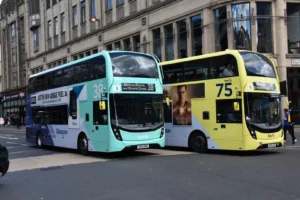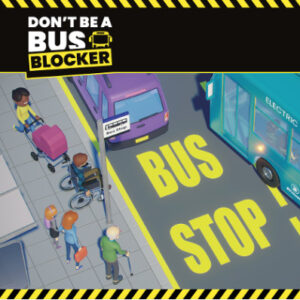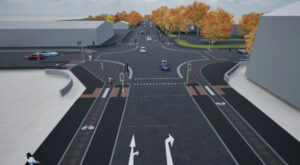Glasgow’s new transport strategy has mapped a course to a city network that tackles poverty, supports economic success, creates thriving, liveable neighbourhoods and plays a central role in the fight against climate change.
Following extensive consultation and preparation over the past year, a final policy framework for the Glasgow Transport Strategy has been set-out that covers over 100 policies that provide a comprehensive vision for how to get about Glasgow in future. But with vehicle emissions accounting for a third of the city’s carbon output, changes to the transport system are regarded as a vital component in Glasgow’s effort to achieve carbon neutrality by 2030.
To support the city’s carbon reduction target, the new strategy sets out the ambition of reducing car vehicle kilometres travelled in Glasgow by at least 30% by 2030. The aim is to encourage travellers to opt for sustainable transport choices such as walking, wheeling or cycling or public transport wherever possible so there is less need to travel by car.
Support for the 30% target comes from initiatives such as council’s Active Travel Strategy, which includes a proposal to build a city-wide network of segregated cycling infrastructure, and the Liveable Neighbourhoods initiative that will support more local access to essential services and enable shorter, local trips by walking, wheeling and cycling. Major projects such as the Clyde Metro, which recently received backing in the Scottish Government’s Strategic Transport Projects Review, and increased bus priority on our roads are also key components in the effort to provide a world-class public transport network that draws people from their personal vehicles.
With 27% of vehicle journeys in Glasgow 1kilometre or less, Councillor Anna Richardson, City Convener for Sustainability and Carbon Reduction, believes there is significant potential for a widespread switch to sustainable transport.
Councillor Richardson said: “A great many trips in vehicles across the city are short and could realistically be achieved by other means. Our task as a council is to ensure there are viable alternatives that support walking, wheeling or cycling or public transport to help reduce car use.
“Cars and other private vehicles will clearly continue to be part of Glasgow’s transport future. But time and again people indicate they would cycle more if it felt safer to do so or the way that public spaces are designed can deter active travel in local communities. Initiatives such as our Active Travel Strategy and our Liveable Neighbourhoods programme are all about creating a better balance on how Glasgow’s streets are used and encouraging people to leave the car behind wherever possible.
“Making in-roads on our car use is essential if we are to bring down the carbon emissions that drive climate change. But supporting sustainable transport choices also means we can make city streets safer and more attractive places to be, which in turns helps to improve quality of life for local residents.
“The new transport strategy fully recognises how important transport is to our daily lives and the overall success of the city. The far reaching policy objectives in the strategy create a vision of a healthy and thriving city but also a sustainable Glasgow that is prepared for the challenge of climate change.”
According to Department of Transport estimates, 1.70 billion vehicle miles were travelled in the Glasgow city area in 2020. This represented a sharp drop in vehicle miles travelled due to the impact of the covid pandemic. Prior to covid, figures for 2019 show a peak of almost 2.250 billion vehicle miles per annum following steady growth in figures over the early part of the 21st century. Around two-thirds of vehicle miles are travelled on trunk roads with a third over local roads.
The Scottish Government recently set a target of reducing car kilometres by 20% and other major cities such as London and Edinburgh have also similar ambitions. The recently published Route Map to achieve the 20% reduction nationally highlights the expectation that car use in rural and island communities will not necessarily reduce at the same rate as in towns and cities, and there is therefore the expectation that cities will contribute strongly to the national target.
Following consideration at the Environment, Sustainability and Carbon Reduction Policy Committee, the final policy framework of the Glasgow Transport Strategy will now go before the council’s City Administration Committee for final approval.
Full details on the Glasgow Transport Strategy can be found via this link.
























